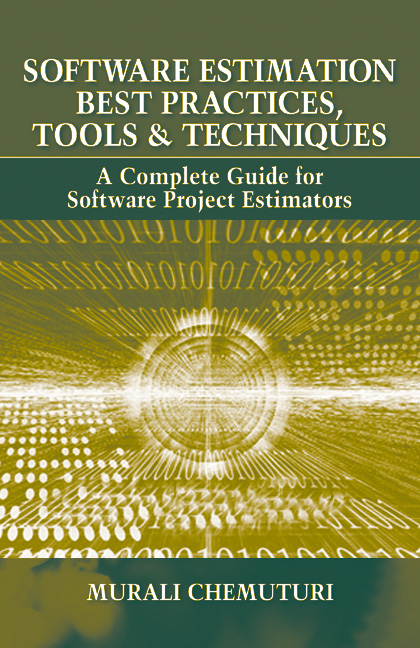Software Estimation Best Practices, Tools, & Techniques
$59.95
A Complete Guide for Software Project Estimators
By Murali Chemuturi
Hardcover, 6×9, 328 pages
ISBN: 978-1-60427-024-2
August 2009
LEARN & EARN: Get 6.4 PDUs in the PMI skill area of Technical Skills
Description
“Effective estimation is one of the most vital success factors of any project, and especially so in the software industry. Yet, many people struggle with how to estimate software projects due to high uncertainty, great complexity, and the pressure to churn out more, faster. In this definitive and much-needed book, Murali Chemuturi offers real-world solutions, explaining all aspects of proper software estimation in an engaging and accessible style. He exposes myths, clears up misconceptions, and offers practical advice on estimating every imaginable kind of software project. This should be on the desk of anyone who manages software projects.”
—Jerry Manas, Author of Napoleon on Project Management and Managing the Gray Areas
Almost every software project begins with the utterances, “What will this cost?” and “When will this project be done?” Once those words are spoken, project stakeholders begin to wrestle with how to produce an estimate. Accurately estimating the cost or time to complete a software project is a serious problem for many software engineers, developers and project managers who struggle with costs running double original estimates, putting their careers at risk. It is reported that nearly 50% of all software projects are shelved and that one of the major causes is poor estimation practices. If developing software for internal use, poor estimates can represent a significant drain on corporate profits.
Worldwide growth in the number of companies specializing in the development of software for use by other companies is staggering. India alone has nearly 20,000 such companies. Intense competition has led to an increased demand for fixed-bid pricing in client/vendor relationships, and has made effective cost estimation even more important and, in many cases, critical to a firm’s survival. There are many methods of estimation. Each method has its strengths and weaknesses, proponents and opponents. Knowing how and which one to use on a given project is key to developing acceptable estimates for either internal or external projects.
Software Estimation Best Practices, Tools, & Techniques covers all facets of software estimation. It provides a detailed explanation of the various methods for estimating software size, development effort, cost, and schedule, including a comprehensive explanation of test effort estimation. Emphasizing that software estimation should be based on well-defined processes, it presents software estimation best practices and shows how to avoid common pitfalls. This guide offers direction on which methods are most appropriate for each of the different project types commonly executed in the software development space and criteria for selecting software estimation tools.
This comprehensive desk reference explains software estimation from scratch to help the beginner and features advanced techniques for more experienced estimators. It details project scheduling, including resource leveling and the concept of productivity, as applicable to software estimators, demonstrating the many benefits of moving from the current macro-productivity approach to a micro-productivity approach in software estimation. Software Estimation Best Practices, Tools, & Techniques: A Complete Guide for Software Project Estimators caters to the needs of all software project stakeholders, from novice to expert. It provides the valuable guidance needed to estimate the cost and time required to complete software projects within a reasonable margin of error for effective software development.
Key Features
- Presents a brief, yet detailed explanation of each the various methods for estimating software size, development effort, cost, and schedule, with guidance on which methods are most appropriate for each of the different project types
- Furnishes criteria for selecting software estimation tools, and shows how to take advantage of best practices and avoid common software estimation pitfalls
- Demonstrates a practical methodology with templates for using Delphi estimation and analogy-based estimation for software projects
- Introduces a new method referred to as software size units (SSU) for measuring software size that does not make use of the untenable concept of “complexity” for adjusting software size
- Provides useful methods for converting software size to effort, deriving true productivity, and analyzing variances between actual and estimated values as a tool for productivity improvement
- WAV offers a free downloadable test effort estimation tool (TPPal), a software size unit estimation tool (SSUPal), and a 180-day demo for a comprehensive estimation tool known as EstimatorPal — available from the Web Added Value™ Download Resource Center at www.jrosspub.com
About the author(s)
Murali Chemuturi is an information technology and software development subject matter expert, hands-on programmer, author, consultant and trainer. He has more than 23 years of information technology and software development experience and several years of academic experience teaching a variety of computer & IT courses. In 2001, he formed his own IT consulting, training and software development firm known as Chemuturi Consultants. Mr. Chemuturi’s undergraduate degrees and diplomas are in Electrical and Industrial Engineering and he holds an MBA and a Post Graduate Diploma in Computer Methods & Programming. He is a published author in professional journals, a member of IEEE, a senior member of the Computer Society of India and a Fellow at the Indian Institute of Industrial Engineering.
Table of Contents
Content
Reviews
“Murali Chemuturi has written an excellent book that provides a nice overview of both the philosophy and practices of software estimation. In it, he covers the theories and practical realities of estimating software development projects in a simple to read, and easy to understand writing style. Software Estimation Best Practices, Tools, & Techniques provides an excellent summary of various methods of software sizing and covers the pros & cons of each, including an excellent primer on Function Point Analysis. It also includes a very helpful review of Software Size Units, which is the latest way to think about the overall size of a software project taking into account both data and process. SSU seeks to overcome much of the difficulty and ambiguity of trying to count “points” needed for FPA.
One of my personal pet peeves is when developers do not include adequate effort in their estimates for test preparation and the overall testing effort. The book covers this area well and includes an excellent overview of incorporating testing into all your estimates, plus it explains multiple ways to help you do it. Since this is a significant area for me in my work, I have read this section over several times and have already incorporated many of the concepts and metrics covered in this book into my projects.
The only area that is not thoroughly covered in this book is how to estimate using iterative or Agile methodologies, as it tends to focus on the traditional software lifecycle process. However, there is still more than enough valuable information in this excellent book. Chemuturi’s book is within easy reach on my desk, and is often stashed in my briefcase. It has easily become my bible for all things related to estimating software application development projects. It is a great value and should become part of any software development manager’s toolkit.”
—Larry Hanthorn, Director, Delivery Excellence, Microsoft Corporation
“Effective estimation is one of the most vital success factors of any project, and especially so in the software industry. Yet, many people struggle with how to estimate software projects due to high uncertainty, great complexity, and the pressure to churn out more, faster. In this definitive and much-needed book, Murali Chemuturi offers real-world solutions, explaining all aspects of proper software estimation in an engaging and accessible style. He exposes myths, clears up misconceptions, and offers practical advice on estimating every imaginable kind of software project. This should be on the desk of anyone who manages software projects.”
—Jerry Manas, Author of Napoleon on Project Management and Managing the Gray Areas
Related products
-

Enterprise Project Portfolio Management
Retail Price: $69.95$59.95 Add to cart -

Metagility
Retail Price: $44.95$39.95 Add to cart -

ROI of Software Process Improvement
Retail Price: $59.95$49.95 Add to cart -

Mastering Business Analysis Standard Practices
Retail Price: $69.95$59.95 Add to cart -

Dynamic Scheduling® With Microsoft® Project 2013
Retail Price: $69.95$59.95 Add to cart

